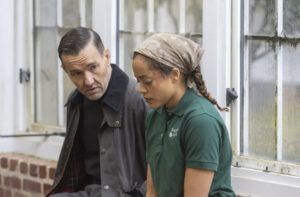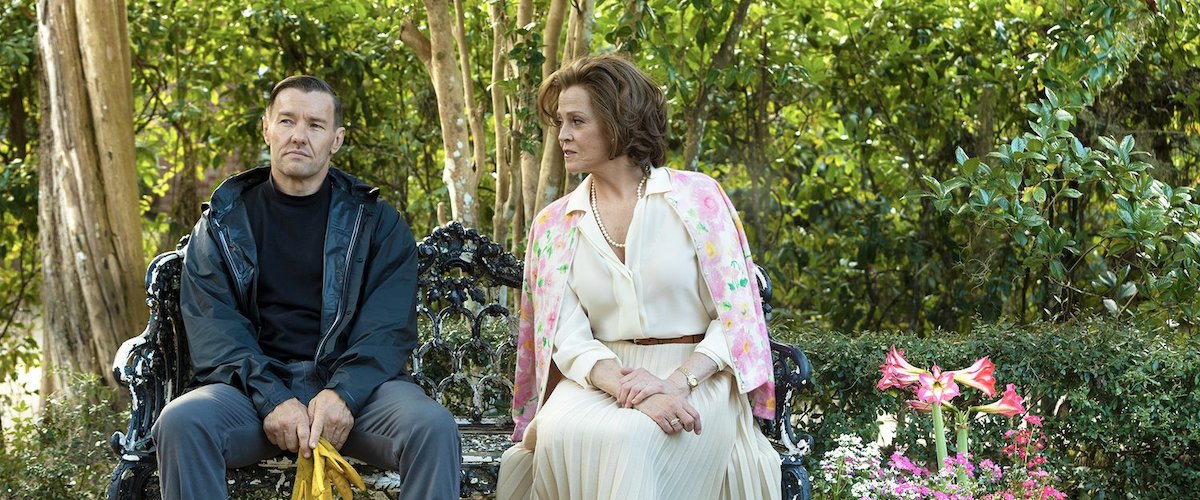Movie Info
Movie Info
- Director
- Paul Schrader
- Run Time
- 1 hour and 51 minutes
- Rating
- R
VP Content Ratings
- Violence
- 3/10
- Language
- 4/10
- Sex & Nudity
- 3/10
- Star Rating
Relevant Quotes
Other seeds fell on good soil and brought forth grain, some a hundredfold, some sixty, some thirty.

Knowing that this is a Paul Schrader movie, we expect that, as in his previous films such as First Reformed, redemption will be a major theme in the story. But it will not come with the simplicity found in a faith-based film, but with far darker overtones and twisted, complicated means.
Following a beautiful credits sequence using time-lapse photography showing gorgeous flowers opening up and blooming, we are introduced to Narvel Roth (Joel Edgerton) sitting at a table and writing in a journal, the first of many such shots scattered throughout the picture. He often makes observations about plants and gardening, stating that gardening is belief in the future. His writings about horticulture are appropriate, as we discover that he is the head gardener of the lush Gracewood Gardens, which, judging by trees and plants is located somewhere in Louisiana. Certainly the garden’s owner Norma Haverhill (Sigourney Weaver), and Narvel’s employer —and we soon see, sometime lover, he tending regularly to her bed as well as to those of roses—will display the racism endemic to so many old money families in that state. Narvel and his loyal grounds crew are preparing the garden for its annual charity event when Norma charges him with taking on her estranged grand-niece Maya (Quintess Swindell) as an apprentice. The young woman’s mother is dead from a drug overdose, and the girl could wind up the same way because she has been hanging out with her mother’s drug dealer, RG (Jared Bankens).

Of course, the biracial newcomer, though she enjoys gardening and becomes adept at it, will become a divisive element. Norma shows little interest in meeting Maya in person (perhaps because the girl is biracial?), with Narvel himself bringing it up. When she at last invites Maya to lunch, they do not get along well. Norma talks about family dysfunction, and when Maya says, “I’m not inadequate,” repeating a term Norma has used, the great aunt declares, “No, of course, you’re not. You’re impertinent.” End of conversation and of lunch. Soon, added to Norma’s possible racism, is her romantic jealousy as Maya and Narvel’s mutual attraction grows, despite their difference in age.
We see how skilled and meticulous a gardener Narvel is, but from his bad dreams and flashbacks we discern that gardening was not his original vocation. Just how dark his past is we see when before the mirror in his monk-like little cottage he strips off his church. The revelation of tattoos with White Nationalism letters and symbols (including two large swastikas on his back) is stark. Even more so is the flashback in which the bearded Narvel cold bloodedly shoots several victims. Then he is caught and escapes retribution by turning states witness against his fellow neo-Nazis and entering the witness protection program, his handler being Deputy Neruda (Esai Morales).
We wonder how Maya will react to Narvel’s racist past when she learns of it. This process unfolds after the jealous Norma has cast the pair out of the garden (something that made me think of the third chapter of Genesis). There is a revelation in regards also to Maya—that she is a drug addict, able mostly to keep it hidden. She is still involved with RG, who beats her up during one of their transactions, which in turn causes Narvel to enter vigilante mode. The dark events following conclude on a note of optimism much more evident than in Schrader’s previous films.
This would be a difficult film for a church group to choose to discuss, even though Schrader’s theme of redemption is at the heart of the Christian gospel. There is even a hint of Good Friday when the gorgeous garden is vandalized, but Easter is less evident, almost lost in the retributive violence that follows. Narvel Roth, to use Jesus’ metaphoric Parable of the Seed and Soils, is not “good soil,” but a mixture of the others, and so his striking down the drug dealers who threaten his beloved Maya involves the same violence by which they live. Just how long the lovers can live in their bliss is not an issue in the film.
The film’s subtle antiracist message is also a draw, but the violence, brief nudity in the sex scene, and strong language will be offensive to some. I appreciate its story of a neo-Nazi changing his stripes (though why he did not remove his lurid tattoos is not addressed), but find the 1998 film starring Edward Norton, American History X , a more acceptable exploration of this social and moral malady. Still, for those who can sit through a hard R film, Schrader offers sufficient rewards. (Watching Sigourney Weaver portray a Southern belle who knows her beauty is fading like the last roses of summer is rewarding in itself.) The writer/director’s newest film might not be up to his First Reformed, or his wonderful Christ figure film Bringing Out the Dead, but it is nonetheless worth watching.
This review will be in the June issue of VP along with a set of questions for reflection and/or discussion. If you have found reviews on this site helpful, please consider purchasing a subscription or individual issue in The Store.

